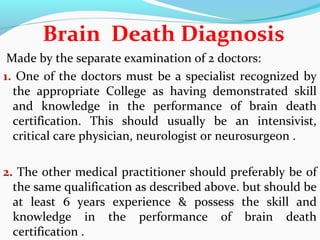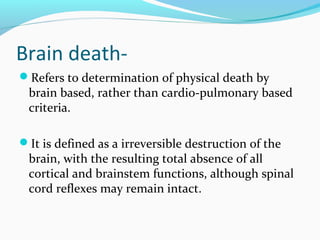What and when is. For such a death entails the death of all organ sys tems.
This results in oxygen not entering the body and the organs especially the brain which affects brain function.

. Even then the brain cells dont all die. The first chapter focuses on the question. The term is also sometimes used in resuscitation research.
In CPR terms biological death refers to permanent cellular damage resulting from lack of oxygen that is not reversible. This definition of death requires complete loss of brainstem function and consciousness and permanent cessation of circulation that cannot be restored. Biological death refers to the death of the body cells while clinical death is when the heart stops and the victim stops breathing when does biological death occur 4-6 minutes after clinical death.
It is obvious that the problems of defining human death cannot be resolved in purely biological terms divorced from all ethical or cultural considerations. 1 These standards took the form of using either a heart or lung functioning criteria for death. As soon as the blood stops circulating it sinks.
Person can be revived if it is not too late. The discipline of thanatology studies the processes associated with death. The clinical death of a person is the death of the brain.
It is either natural as when it happens in the usual course without any violence. The cessation of life. In a specific case with a reasonable previous record of catastrophic brain damage and certain neurological exploratory signs an expert practitioner is able to diagnose clinical.
There is a fairly general consensus in western medicine on the necessary criteria and the mode of proceeding for a correct diagnosis of brain death. The legal definition of death is also not necessarily identical with the ordinary medical definition of death and is inconsistent with extraordinary medical definitions. Complete restoration of vital functions is possible during clinical death but biological death involves an irreversible cessation of physiological processes in the cells and tissues.
It occurs when the heart stops beating in a regular rhythm a condition called cardiac arrest. It is also known as somatic or systemic death. 2 To determine death physicians would feel for the pulse listen for breathing hold a mirror before the nose to test for condensation and look to see if.
At the opposite end of the spectrum from cell death lies the death of a human being. Death attributed to natural causes. The certification of death of an individual namely the medical act which provides a written record of a persons death diagnosis has been a clinical practice for centuries.
The quickest reaction occurs in the brain where the cells die after three to five minutes. It is obvious then that bio logical death is a process more or less gradual depending on the cir cumstances. It means death of cells and tissues individually.
Stopped blood circulation has historically proven. Or violent when it is caused either by the acts of the deceased or those of others. Traditionally death has been determined by the medical profession using basic assumed cardiopulmonary standards.
Consequences requiring common clinical standards for its diagnosis and legal regulation since death certification can vary quite widely among countries. There was no evidence for coexistent thinking among adults only a clear distinction between biological explanations about death and supernatural explanations about the afterlife. The two main stages of death are successively clinical death and biological or true death.
If this condition is not quickly corrected then biological death will occur which is when the brain has been deprived of blood and oxygen long enough and the cells begin to die. Socioeconomic status was partly related to childrens biological ideas whereas cognitive ability and experience of illness and death played less important roles. Even under the tradi tional criteria after clinical death was pronounced some organs and tissues were still alive continuing.
The agony from agon struggle--is the border between life that has not stopped and death which has not started clinical death is the abolishing of the organs functions without its cellular death--is a reversible condition but the return has frequently traumatic effects and biological death real or irreversible in the case of which there is no possibility of reanimation of the central. The legal definition appears as an inclusive concept involving cessation of all vital functions cessation of respiration cessation of circulation and impossibility of. This chapter is one of two conceptual chapters that set up the analytical foundation for the remaining empirical case studies which are mainly historical in character.
This chapter addresses a number of questions. In one recent case a woman was erroneously declared dead after having a heart attack and wound up freezing to death in a body bag in. Clinical death is treated as a.
But difficulties arise because the point of. Sometimes the line between life and death can seem blurred. When death occurs depends on what we think death is.
This may be reversible ie. The heart can continue to beat for up to half an hour. Clinical death means complete and irreversible stoppage of circulation respiration and brain functions.
Biological death is death at molecular or cellular level. Clinical death is simply when a person has stopped breathing. The agony from agon struggle--is the border between life that has not stopped and death which has not started clinical death is the abolishing of the organs functions without its cellular death--is a reversible condition but the return has frequently traumatic effects and biological death real or irreversible in the case of which there is no possibility of reanimation of the central.
Clinical death is the medical term for cessation of blood circulation and breathing the two criteria necessary to sustain the lives of human beings and of many other organisms. In summary no heartbeat no breathing no brain activity clinical death but it does not necessarily spell Death.

What And When Is Death Remembering And Disremembering The Dead Ncbi Bookshelf

Difference Between Somatic Death And Molecular Death Compare The Difference Between Similar Terms

0 Comments